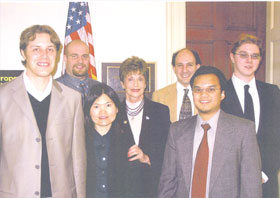 |
| Nevada APS Members Visit Their Congresswoman Six APS members from Nevada visited with during the Congressional visits organized by APS. From left to right are Philippe Weck, Zachary Quine, Eunja Kim, Congresswoman Shelley Berkley, Michael Pravica, Edward Romano, and Brian Yulga. |
Over two days in March, some 110 physicists and physics students took time off from the APS March Meeting in in Baltimore, Maryland, to discuss the importance of science research funding with their individual Congressional representatives.
“Carrying the message to individual offices remains one of the best means of influencing a Member of Congress,” says Kimberly Regan, science policy fellow with the APS Washington Office, of the incentive behind organizing the event.
“The advantageous location of this year’s meeting provided an exciting opportunity to have attendees from as many districts and states as possible travel to Washington, DC, to educate Congress on the importance of science funding.”
Following a briefing in Baltimore, participants were bused to Capitol Hill. They met with staffers–and in some cases the members themselves–in 153 Congressional offices from 31 states. The emphasis was primarily on encouraging Congress to fully fund the Bush administration’s FY07 budget request as outlined in the American Competitiveness Initiative. This includes an 8% increase for NSF, a 14% increase for the DOE Office of Science and an 18% increase for NIST. Participants also urged Congressional members to increase NASA’s science budget by at lease 3%, in line with the current rate of inflation for research.
Another focus of the visits was to encourage Congressional members to sign “Dear Colleague” letters circulating in the House and Senate, calling for support of NSF and DOE. There were 164 signatories on the House NSF letter, and, at press time, 136 on the House DOE letter, and 66 signatories on the Senate DOE letter. Many were first-time signers, which Regan credits to the efforts of APS members during the visits.
The visits coincided not only with the APS March Meeting, but also the start of Congressional considerations of the appropriations for the next fiscal year. However, the event also had more long-term objectives, namely demonstrating to APS members the importance of informing their elected officials about what physicists do, and encouraging them to become more active in this regard.
Marie Mapes of the University of Wisconsin met with staffers from five offices of members of Congress from her state, and emphasized that the US is lagging behind other areas of the world in terms of both R&D funding and producing science PhDs. Mapes decided to participate in the Congressional visits “because I wanted to let my representatives know how best to represent me,” she said. “Now that I know it is relatively easy to access our members of Congress, I’m much more likely to approach them again about issues that are important to me.”
Cris Ugolini of Kansas State University visited five Congressional offices. He participated in the event because he believes strongly that there is a great need for increased scientific funding. “We as scientists often discuss amongst ourselves the need for more funding to perform basic research,” he said. “But we rarely act out to inform our respective government officials of the desired funding.”
He attributes this in part to the fact that “many feel their voice cannot make a significant change.” One of the senators whose office he visited signed the DOE "Dear Colleague" letter the very next day, which convinced Ugolini that “our government officials listen to their constituents, and the voice of one person can still have an impact.”
While describing the outcome as “a terrific start” to the appropriations process, Regan emphasized, “We view these visits as part of our members developing a relationship with an office rather than a one-time event.” The hope is that members will follow up in the future, make visits to home offices, and perhaps even invite staff members of Congressional representatives to visit their laboratories. In turn, Congressional offices might find APS members to be a valuable resource on science and technology policy issues.
The Washington office also set up a “Contact Congress” booth at the Baltimore Convention Center, encouraging more than 1100 attendees to sign letters to their representatives on the Hill. Those letters were hand-delivered to Congressional offices later in the week (see "Meeting Attendees Contact Congress" picture).
©1995 - 2024, AMERICAN PHYSICAL SOCIETY
APS encourages the redistribution of the materials included in this newspaper provided that attribution to the source is noted and the materials are not truncated or changed.
Associate Editor: Jennifer Ouellette
Staff Writer: Ernie Tretkoff
May 2006 (Volume 15, Number 5)
Articles in this Issue

